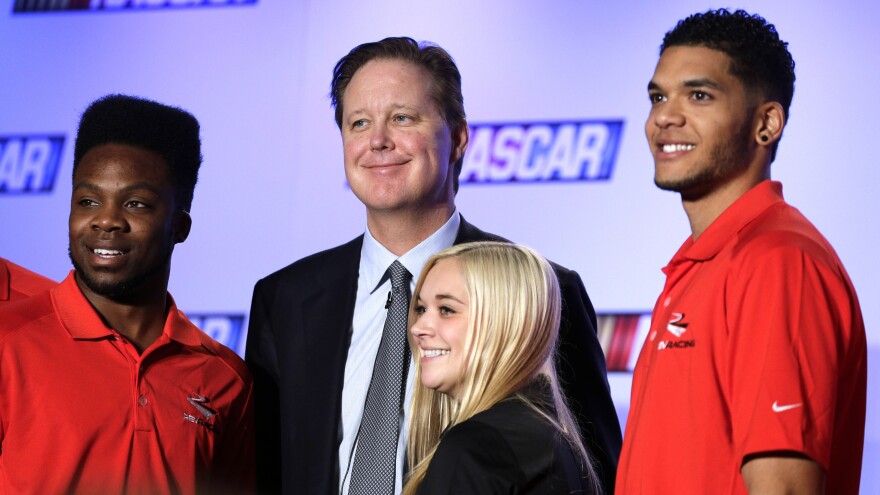On Dec. 1, 1963, Wendell Scott became the first African-American to win a race in NASCAR's top division. More than 50 years later, he is still the only African-American to have done that.
The new NASCAR season begins this weekend, and some in the sport are using Scott's recent induction into its Hall of Fame to celebrate a pioneering achievement — but also to examine why NASCAR still struggles with diversity.
In the 1960s, virtually no one would help Scott with his race car, so his family did. Sybil Scott remembers being a small child, washing and greasing car parts with her exhausted dad.

"Sometimes he would be about to fall on his face, 3, 4 o'clock in the morning," she says. "I witnessed quite a bit."
There were boos and racial slurs, death threats and wrecks. But two words were forbidden in the Scott family: "can't" and "never."
"There were times when Daddy didn't know how the lights were going to still be on the next day," Sybil Scott says. "But he wouldn't want us to worry about it. He wouldn't want Mommy to worry about it. He knew that he was skilled enough. Daddy always knew how to make a way."
Two years after Wendell Scott made his debut in NASCAR's top series, his perseverance turned historic. As a Hall of Fame video explains, "With a patched-up car and second-hand parts, he became the first African-American to win a NASCAR premier series event."
Scott kept racing until 1973, and died in 1990.
No other African-American has won a top NASCAR race, and very few have even gotten behind the wheel. But Scott's accomplishment has opened doors for others, like Brad Daugherty, a former NBA All-Star who became co-owner of a NASCAR racing team about six years ago.
"Realistically, for someone like myself, it gave me the opportunity that I had," Daugherty says.
Daugherty's passion for racing stems from his upbringing in rural North Carolina. He says it can be tough to attract other African-Americans to the sport, especially kids.

"It's easy to go play basketball," he says. "All you need is a basketball. It's easy to go play football; all you need is a football and some buddies. You can't go play racing, and if you don't have a cultural lineage to racing, it's very, very difficult."
The lack of African-American drivers plays a role too, says Steve O'Donnell, NASCAR's executive vice president.
"You always want to see someone you may be able to relate to on television or see and look up to, and that's important to us, to have that on the track," O'Donnell says.
But the NASCAR track is beginning to diversify. Two years ago, Darrell Wallace Jr. became the first African-American since Scott to win a lower-tier national NASCAR race. Wallace came up through NASCAR's Drive for Diversity, a developmental program created in 2004 for minority and female drivers and crew members.
Driver Dylan Smith, who is in the program this year, has heard other African-Americans stereotype his sport.
" 'Oh NASCAR, it's a bunch of more or less white Caucasian people, and that's what it is — they drive race cars, turn left,' " Smith paraphrases. "But there's a lot more. So when I go to schools and stuff, I explain, 'We have so many different levels and tiers. If you like math and building stuff, you can be an engineer.' "

Smith, 22, says some of the kids he talks to don't realize there are opportunities behind the scenes at races. As an example, NASCAR teams up with historically black colleges and universities to hold pit crew tryouts.
At the Hall of Fame in Charlotte, N.C., Sybil Scott says NASCAR is making progress.
"The climate is so different," she says. "Yes ... I do feel that it's moving forward. I think we take some steps backwards sometimes. I think we get stagnant sometimes."
Although there are still few minority drivers, Smith's racing experience is vastly different than Scott's. He says when he puts the helmet on, his competitors just see another driver to try to pass.
"I've had incidents on pit road and on the track with people," he says, "but never once did I think it was because of the color of my skin."
Copyright 2015 WFAE



